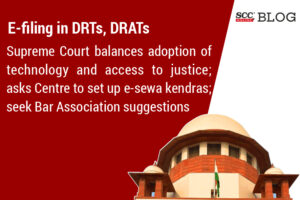Supreme Court: In the case where the mandatory e-filing of pleadings before the Debt Recovery Tribunals (DRTs) and Debt Recovery Appellate Tribunals (DRAT) was challenged on the ground that DRTs are constituted in far flung areas where internet connectivity may not be adequately available, the 3-judge bench of DY Chandrachud*, CJ and PS Narasimha and JB Pardiwala, JJ has issued directions for attending to the genuine grievances of the members of the Bar in regard to the availability of facilities that would ensure that in the adoption of e-filing, no segment of the citizens is unable to access justice.
Why was e-filing challenged?
On 23-01-2020, the Department of Financial Services in the Union Ministry of Finance notified the Debt Recovery Tribunals (DRTs) and Debt Recovery Appellate Tribunals (DRATs) Electronic Filing Rules 202o, by which, originally, the e-filing of pleadings and applications was made optional but by a subsequent notification dated 22-07-2021, by which the e-filing of cases involving a value of Rs 100 crores and above was made mandatory. On 31-01-2023, Union government issued a notification for amending the Debt Recovery Tribunals (DRTs) and Debt Recovery Appellate Tribunals (DRATs) Electronic Filing Rules 2020 to make e-filing of pleadings by applicants mandatory. It was provided that any other form of filing shall not be taken on the record.
Challenging this, it was argued that this amendment was made without holding deliberations with all stakeholders. As DRTs are constituted in far flung areas where internet connectivity may not be adequately available, hence, it was submitted that an exception should be provided for: (i) Just and sufficient cause; (ii) Senior citizens; and (iii) Female practitioners and clients.
On the other hand, the Union of India argued that the introduction of mandatory e-filing was not abrupt or hasty. On the contrary, it was preceded by consultations and training programmes which were conducted for the members of the Bar. The implementation was made on a gradual basis in three stages. As regards the availability of infrastructure, it was submitted that help desks have been provided at all DRTs/DRATs to attend to any glitches or requests for assistance.
Supreme Court’s Balancing Act
While the Court stressed on the fact that e-filing provides transparency and efficiency in the administration of justice as it provides for 24×7 access to the court system and, in fact, facilitates the convenience of lawyers as well as litigants, it was also mindful of the fact that there is a digital divide in the country and not all citizens have access to the internet or the facilities required for the effective use of technology.
“Technology is an enabler and a facilitator. Hence, no segment of the citizens should be left behind in the adoption of technology, least of all, in terms of access to justice.”
Bar Associations’ representation on difficulties faced in e-filing procees
The Court, hence,
-
permitted the Bar Associations representing the collective voice of the lawyers in the DRTs/DRATs to submit their representations to the Department of Financial Services if any specific difficulties are encountered in the process of e-filing. The representations should focus on concrete suggestions which have to be implemented to facilitate e-filing. This direction has been issued in order to ensure that any glitches that may arise are attended to effectively.
-
directed all the Chairpersons of the DRATs and the Presiding Officers of the DRTs to submit monthly reports to the Department of Financial Services initially for a period of six months, pointing out the experience with e-filing and suggesting, if any upgradation of the facilities or the software is necessary.
-
directed the Director General of NIC shall constitute a team to monitor the progress of e-filing in the DRTs/DRATs so that any difficulties which are encountered can be suitably addressed on a real time basis. The efiling module must be upgraded with periodical developments.
-
recommend to the Union Government to set up e-sewa kendras in addition to setting up held desks, at all the centres of the DRTs or, as the case may be, DRATs to facilitate e-filing of cases and provide a one-step solution which encompasses all the e-services at the DRTs/DRATs. The e-sewa kendras should have adequate equipment in the form of computers and 10 scanners, together with robust internet connectivity so as to facilitate the process of e-filing. In this context, a Standard Operating Procedure must be prepared by the Department of Financial Services in consultation with NIC, setting out the facilities at every e-sewa kendras. This would be in line with the mission of the e-Committee of the Supreme Court of India for providing e-sewa kendras at court establishments across the country. The setting up of e-sewa kendras would provide access to justice to lawyers and litigants.
On the submission that there should be a general exception to female practitioners and litigants, the Court disagreed and stated that there is no reason to postulate that there is a gender divide in one’s inherent ability to use technology. The Court, however, directed that the help desks can consider providing a dedicated portal to address the grievances of female litigants.
The Court directed that the above-mentioned directions should be completed within three months. It has, however, been made clear that the Department of Financial Services is not precluded from making such further arrangements as are found necessary to deal with an emergent situation in any of the DRTs/DRATs in various parts of the country as,
“In a country as diverse like India, a onesize-fits approach cannot be adopted in all circumstances and situational modifications can be suitably adopted according to exigencies.”
[MP High Court Bar Association v. Union of India, 2023 SCC OnLine SC 365, decided on 29.03.2023]
*Judgment authored by CJI DY Chandrachud.
Advocates who appeared in this case :
For Petitioner: AOR Siddharth R Gupta;
For Union of India: Advocate Shyam Gopal.

